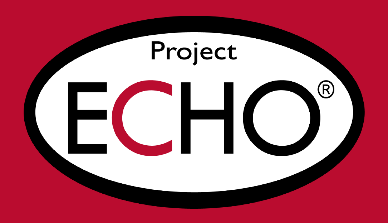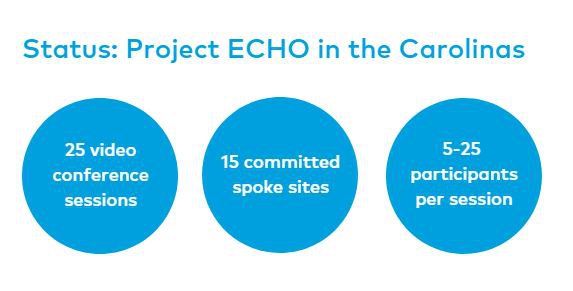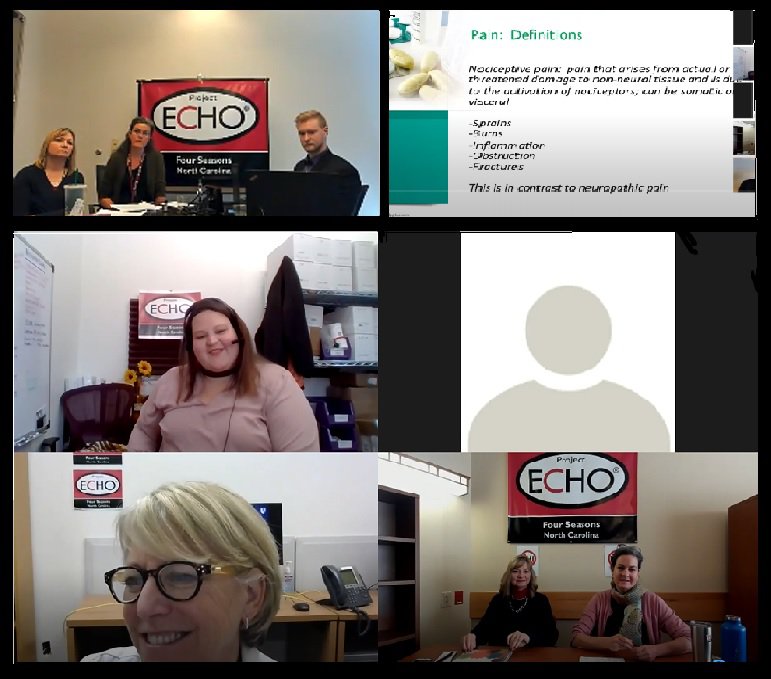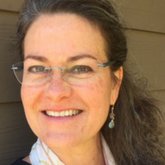A Progress Report: Expanding Palliative Care with Project ECHO
I am writing to update the CAPC community on Project ECHO to Expand Palliative Care in the Carolinas, which was originally discussed in a 2018 blog post. We have been busy growing our newly-funded project over the past year, and are excited to share some of our successes and challenges. I’ve provided brief background below, but recommend reading the original blog post for additional context.
Playing Catch-Up: A Background on Project ECHO

Project ECHO (Extension for Community Health Outcomes) was founded at the University of New Mexico Health Sciences Center in 2003, with the goal of de-monopolizing specialist knowledge, and amplifying the capacity to provide best practice care for rural and underserved people in New Mexico, in their own communities. Through the use of multisite teleconferencing, Project ECHO links specialists from a main “hub”, with clinicians in local communities—the “spokes” of the model. Together, the hub and spokes participate in regular video conference “teleECHO” sessions that allow for knowledge sharing and mentoring.
Since 2003, Project ECHO has grown to more than two hundred projects, covering one hundred diseases and medical conditions, in the United States and thirty-one other countries.
How I’m Involved
In an effort to expand Palliative Care in the Carolinas, my organization (Four Seasons Compassion for Life), in partnership with Duke University Palliative Care and DeltaCareRX, was awarded $750,000 over a two-year term, using Project ECHO to achieve the following goals:
- Increase the number of providers in the Carolinas with training and mentorship in palliative care
- Improve frontline provider knowledge and skills so they can deliver high-quality palliative care to their own patients
- Increase patient access to serious illness care that will improve patient and caregiver quality of life, lessen symptom burden, and improve patient and family satisfaction with communication about what to expect, as well support through the course of illness
- Increase hospice utilization and length of stay in rural communities
The Status of Our Project
We are officially up and running as a Project ECHO “hub” site. To date we have held twenty video conference sessions, have fifteen committed “spoke” sites, and the number of participants in the teleECHO sessions has ranged from five to twenty-five. During the sessions, we have presented twelve patient cases, and generated rich discussion around clinical questions related to our patients.

In addition, we have presented four role play sessions which were well received by the group. We presented a mini-learning block on quality improvement, and discussed the importance of project evaluation in palliative care with Dr. Arif Kamal. Finally, we have presented twenty didactic sessions, with topics including:
- The Basics of Palliative Care, Who Are We and What Do We Do, presented by Dr. John Morris
- Prognostication for Palliative Care Providers, presented by Dr. Janet Bull
- Advanced Communication Skills, Balancing Hope and Reality, presented by Dr. Sandra Whitlock
- Treating Nausea, Why Zofran Isn’t One Size Fits All, presented by Dr. Sara Warzecka
- Stoned, A Doctor’s Case for Medical Marijuana, presented by Dr. David Casarett
Goals Reached + Feedback Along the Way
We are pleased with the fruits of our efforts. Our original year-one projected number of spoke sites was five to ten; we have surpassed that, reaching fifteen actively participating sites. We have also established a curriculum based on American Academy of Hospice and Palliative Medicine (AAHPM)’s Essentials, and are well into delivering up-to-date, core didactic material for participants.
Recruiting didactic presenters has been surprisingly easy in that everyone asked has been generous with their time and willing to present to our learning community.
Recruiting didactic presenters has been surprisingly easy in that everyone asked has been generous with their time and willing to present to our learning community. With Duke University Palliative Care serving as a partner for this project, we have had the benefit of expanded access to these specialists, which has been exciting. We have provided thirty free CME credits for providers, and have started collecting data from participants towards evaluation of the project.

Feedback Has Been Regular and Robust
- “I really love the in-depth evidence-based data and information we get, so keep that coming!”
- “I enjoy these sessions and have learned something new from each one I have attended. I really enjoy hearing comments from the palliative pharmacist during the case reviews; we don’t have a pharmacist on our palliative team so I have found her contributions to be very enlightening. Thank you for allowing us to participate in project ECHO PAL!”
- “This is an excellent method of teaching and learning.”
- “Really appreciate the opportunity to participate.”
"This is an excellent method of teaching and learning."
Challenges to Date
The schedules of palliative care providers have hindered participation by some, which may not come as a surprise. To address this, we encourage leadership of target palliative care organizations to offer sessions as dedicated “lunch and learn” hours—a nod toward supporting resilience. Added benefits include sessions starting and ending promptly, free CMEs, and availability out-of-session for provider follow-up questions and discussion. Finding creative solutions to encourage participation is ongoing.
The schedules of palliative care providers have hindered participation by some, which may not come as a surprise.
Another goal to which we aspire is finding more providers that are willing and comfortable sharing patient cases with the group, as case-based learning is a foundations of the ECHO model. Reportedly, this is a problem that other ECHO groups face, and to address this, we try to make sessions as friendly and welcoming as possible, leaving providers empowered to speak up. Patient cases and questions that have been shared during sessions have spurred much conversation within the learning community, which has been enlivening, as we are all learning from complex cases, and from each other.
Project Evaluation
There has been much discussion in the larger ECHO space regarding evaluation of the model. Showing the project has a positive impact could lead to valuable expansion and could help in securing additional funding for the project. As ECHO is a provider-to-provider learning model, without direct patient contact, it has been difficult for ECHO groups to collect patient-specific data or to show benefits for patients.
A notable exception to this is the Aurora et al. study, published in the New England Journal of Medicine in 2011, which showed that the quality of hepatitis C care provided by ECHO-trained clinicians in underserved parts of New Mexico was equal to care provided by the university-based specialists. Other studies, such as Bouchonville et al., have measured provider outcomes with use of project ECHO, which are encouraging. We ultimately aim to determine whether Project ECHO is an effective tool for improving palliative care patient and provider outcomes, the latter including: self-efficacy, knowledge base, and satisfaction with palliative care work. We are well into data collection from participants and look forward to sharing what we learn.
In Conclusion
Since the beginning of this project, we have aimed to “think big”, and our overarching goals, outlined earlier, remain the same. Some of the most encouraging and enlightening aspects of this project have been:
- The learning is multidirectional; we all learn from each other’s experience, expertise, and ideas.
- In the spirit of Project ECHO, we promote the concept and practice of the democratization of medical knowledge. When more providers know and engage in best practices, more patients benefit.
- Using technology to reach providers and patients wherever they are may help reduce disparities in medical care.
We will update you again next year. In the meantime, please leave your comments below, or contact us directly to learn more, share ideas, or to get started with your own palliative care ECHO community.
